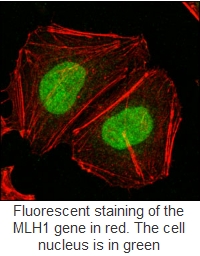 Hereditary nonpolyposis colorectal cancer or HNPCC, is the most common known hereditary cause of colon cancer. It is also associated with an increased risk of ovarian cancer. Another name for it is Lynch Syndrome.
Hereditary nonpolyposis colorectal cancer or HNPCC, is the most common known hereditary cause of colon cancer. It is also associated with an increased risk of ovarian cancer. Another name for it is Lynch Syndrome.
The majority of Hereditary Nonpolyposis Colorectal Cancers are caused by mutations in one of several genes that are responsible for correcting “spelling mistakes” in DNA that occur during the cell division process. These are called mismatch-repair genes and the ones responsible include MSH2, MSH6, PMS1, MLH1, MSH3 and PMS2.
When these genes are mutated the mismatches in the DNA remain. If these accumulate in genes that control cell growth and lead to widespread genomic instability, the affected cells will grow uncontrollably and lead to tumor formation.
The lifetime risk of developing ovarian cancer if a woman has Hereditary Nonpolyposis Colorectal Cancer is approximately 10%. The average age at diagnosis is 40 years old, which is younger than the age for ovarian cancer associated with BRCA1 or BRCA2 mutations (average 50 years old) and also sporadic ovarian cancer (cancer that is not hereditary).
Ovarian cancers associated with Hereditary Non-Polyposis Colorectal Cancers are commonly moderately or well differentiated. In addition to ovarian cancer, the risk of endometrial (uterine) cancer is also increased. The lifetime risk of endometrial cancer increases to approximately 40%.
There are several features that suggest that someone may have Hereditary Nonpolyposis Colorectal Cancer, these are:
- Three or more relatives with colorectal cancer or other HNPCC-related cancer (cancer of the endometrium, ovary, small bowel, ureter, or renal pelvis)
- Colorectal cancer affecting at least two successive generations
- At least one case of cancer should be diagnosed under the age of 50 years
 Screening is controversial for ovarian cancer. The existing methods are not very sensitive and non-specific. However women that have Hereditary Non-Polyposis Colorectal Cancer should consider undergoing screening every 6 months by way of a CA-125 test and a transvaginal sonogram so that if ovarian cancer does develop, there is a greater chance of catching it early on and thus giving a woman a greater chance of survival.
Screening is controversial for ovarian cancer. The existing methods are not very sensitive and non-specific. However women that have Hereditary Non-Polyposis Colorectal Cancer should consider undergoing screening every 6 months by way of a CA-125 test and a transvaginal sonogram so that if ovarian cancer does develop, there is a greater chance of catching it early on and thus giving a woman a greater chance of survival.
Genetic testing for Hereditary Nonpolyposis Colorectal Cancer is available, but is complex as there have been 5 causative genes identified to date, which makes testing harder.
Genetic counseling is recommended for women to help decide what actions to take in order to reduce their risks of developing ovarian cancer if they have been diagnosed with HNPCC.